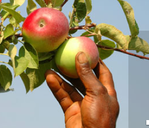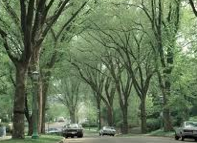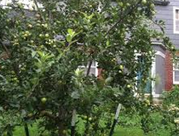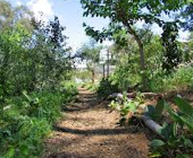Edible landscaping and community building opportunities for lawns:
Imagine edible landscapes that connect neighbors while building and nourishing community!

Integrated, resilient communities, with meaningful relationships to the land are elegantly equipped to cooperate, rather than compete with each other and the land to meet the needs of all. Community-wide participation in public planting efforts would set an example for suburban neighborhoods in the region.
If you're interested in offering some lawn space to support Help Yourself!, transforming your lawn into a forest garden, or beginning a landscaping transition in your neighborhood, please get in touch! You can:
|
|

Host Families Wanted for Baby Fruit Trees & understory herbs
Help Yourself uses Tripple Brook Farm for some greenhouse access, but also seeks folks willing to baby-sit trees in their lawns until they are large enough to plant elsewhere.
Trees planted in public places need to be big enough to survive foot traffic, curious children, dogs, mowers and more. Established trees, 4 ft. or more are impressive, durable, yield sooner, and more recognizable. Buying fruit and nut tree seedlings in bulk offers incredible discounts, stretching our donation-based budget much further than by buying larger retail trees - which can be 100 times more expensive. 'Crowd-sourcing' our nursery space across front lawns in the area ensures a reliable, abundant supply of low cost adolescent fruit & nut trees for years to come, large enough to transplant.
Baby-sitting trees requires only a small sunny patch of lawn and occasional watering and mulching. After 1-5 years, when the trees are big enough, HYS volunteers will return to transplant them elsewhere. In return for your commitment, you'll get to keep some of the trees. Species include plum, bush cranberry, juneberry, mulberry, gooseberries, rose, persimmon, hazel, hackberry, and more.
We're also looking for folks willing to plant part of their yards with understory herbs. These spreading plants assist fruit trees and forest gardens in their health, pollination and fruit set. Can you spare some real-estate, and occasionally help divide these plants?
Help Yourself uses Tripple Brook Farm for some greenhouse access, but also seeks folks willing to baby-sit trees in their lawns until they are large enough to plant elsewhere.
Trees planted in public places need to be big enough to survive foot traffic, curious children, dogs, mowers and more. Established trees, 4 ft. or more are impressive, durable, yield sooner, and more recognizable. Buying fruit and nut tree seedlings in bulk offers incredible discounts, stretching our donation-based budget much further than by buying larger retail trees - which can be 100 times more expensive. 'Crowd-sourcing' our nursery space across front lawns in the area ensures a reliable, abundant supply of low cost adolescent fruit & nut trees for years to come, large enough to transplant.
Baby-sitting trees requires only a small sunny patch of lawn and occasional watering and mulching. After 1-5 years, when the trees are big enough, HYS volunteers will return to transplant them elsewhere. In return for your commitment, you'll get to keep some of the trees. Species include plum, bush cranberry, juneberry, mulberry, gooseberries, rose, persimmon, hazel, hackberry, and more.
We're also looking for folks willing to plant part of their yards with understory herbs. These spreading plants assist fruit trees and forest gardens in their health, pollination and fruit set. Can you spare some real-estate, and occasionally help divide these plants?

Neighborhood fruit trees:
If you have a yard, you're lucky. Let's plant a neighborhood fruit tree in it. Fruit trees are available at cost, or sliding scale to residents in the Valley who allow these trees to be mapped as public access. The more trees we plant in our urban and suburban neighborhoods, the better they'll all pollinate each other, and the closer our communities will become. Species available include apple, persimmon, pear and Asian pear, hazlenuts, plums, and a number of berry species, in full, semi-dwarf and dwarf sizes.
If you have a yard, you're lucky. Let's plant a neighborhood fruit tree in it. Fruit trees are available at cost, or sliding scale to residents in the Valley who allow these trees to be mapped as public access. The more trees we plant in our urban and suburban neighborhoods, the better they'll all pollinate each other, and the closer our communities will become. Species available include apple, persimmon, pear and Asian pear, hazlenuts, plums, and a number of berry species, in full, semi-dwarf and dwarf sizes.

Neighborhood shade trees:
Many of Northampton's streets were once lined with mature shade trees – elms, sycamores, maples and oaks. Over the years many died from ice storms and disease. Today, the city lacks a budget to replace trees along the tree belt, let alone expand plantings. In comparison, Amherst has had the foresight to invest 600k$ in large scale plantings, including many nut trees.
While we work towards better budgeting as a town, a citizen volunteer group called Shade Trees Northampton (Gazette article) is seeking town residents to plant shade trees on their front lawns. A variety of tall, spreading shade trees are available for purchase (110$ ea), including planting. Species available: red oak, red maple, gingko, katsura tree, copper beech, tulip tree, sycamore, and English oak. To participate, email Rob: robpostel@comcast.net
If you live in the hilltowns, check out the Hilltown Legacy Tree Project. Based in Buckland, the HLTP plants large, disease resistant elms and other species on folks' lawns & institutions.
Or, how about a fruiting shade tree?:
Help Yourself! is offering large, shade casting fruit or nut tree species for front lawns in the Valley. These trees are available for sale, generating funds for public plantings. They are free of charge for homes who allow them to be and mapped as public access trees. As food and fuel prices rise, consider one for your yard! It will shower your community with real nutritious wealth for centuries to come. What if you went door to door on your street, and asked your neighbors to participate as well? How about the cul-de-sac?
Partial list of species:
Many of Northampton's streets were once lined with mature shade trees – elms, sycamores, maples and oaks. Over the years many died from ice storms and disease. Today, the city lacks a budget to replace trees along the tree belt, let alone expand plantings. In comparison, Amherst has had the foresight to invest 600k$ in large scale plantings, including many nut trees.
While we work towards better budgeting as a town, a citizen volunteer group called Shade Trees Northampton (Gazette article) is seeking town residents to plant shade trees on their front lawns. A variety of tall, spreading shade trees are available for purchase (110$ ea), including planting. Species available: red oak, red maple, gingko, katsura tree, copper beech, tulip tree, sycamore, and English oak. To participate, email Rob: robpostel@comcast.net
If you live in the hilltowns, check out the Hilltown Legacy Tree Project. Based in Buckland, the HLTP plants large, disease resistant elms and other species on folks' lawns & institutions.
Or, how about a fruiting shade tree?:
Help Yourself! is offering large, shade casting fruit or nut tree species for front lawns in the Valley. These trees are available for sale, generating funds for public plantings. They are free of charge for homes who allow them to be and mapped as public access trees. As food and fuel prices rise, consider one for your yard! It will shower your community with real nutritious wealth for centuries to come. What if you went door to door on your street, and asked your neighbors to participate as well? How about the cul-de-sac?
Partial list of species:
- Hackberry – spreading elm relative with small, sweet fruity rich nuts. Grows to 65 x 65 ft.
- Mulberry – fast growing, spreading, heavily productive. Sweet berries. Grows to 30-40 ft.
- Chinese Chestnut – carb rich nuts with spiky shells. Grows to 80 ft.
- Black Walnut – tall, heavily productive. Rich nuts with green medicinal hulls. Grows to 100 ft.
- Persimmon – native, sweet fruit stays on tree into winter. Grows to 65 ft.
- Hazelnuts – fast growing dense shrub, hedge and tree species, grow to 12-20 ft.
- Swamp white oak – edible, sweet acorns. Stately oak tree, grows to 80 ft.
- Gingko – Tall, slow growing handsome tree. Medicinal leaves. Females produce edible nuts in pungent fruits. Grows to 100 ft.

Already have fruit or nut trees?:
These services are offered to folks who allow community access to fruit or nut trees on their property.
These services are offered to folks who allow community access to fruit or nut trees on their property.
- Mapping: Existing trees can be placed on a community map, inviting folks to harvest. They will also go the maintenance list for pruning.
- Grafting: We're able to graft heirloom varieties of apple, plum, pear and cherry onto existing ornamental or 'crab' fruit trees in your yard. This improves yield and expands local diversity. We can use your tree as source of scion wood for more grafts.
- Guild / Polyculture plantings: Planting a community of herbs and flowers underneath trees reduces maintenance like weeding, mulching, watering, fertilizing and spraying. It increases pollination, fruit yield, and nutritional content of fruit, as well as yielding edible and medicinal herbs

Yards sought for community compost:
HYS is seeking yards to receive lawn clippings and leaves, delivered by the Pedal People co-op. We'll set up the piles, and remove finished mulch, which you are also welcome to. Could your neighbors bring food and leaves there, too?
HYS is seeking yards to receive lawn clippings and leaves, delivered by the Pedal People co-op. We'll set up the piles, and remove finished mulch, which you are also welcome to. Could your neighbors bring food and leaves there, too?

Community access forest gardens:
Help Yourself is looking install forest gardens for folks willing to transform their front yards or undeveloped properties into community accessible, free-food forest gardens. This service is offered at a negotiable, discounted cost. Forest gardens are diverse, edible landscapes modeled after forest ecosystems. The beneficial relationships between plants and wildlife create low maintenance, long term gardens, many times more productive and diverse than traditional vegetable farms.
Help Yourself is looking install forest gardens for folks willing to transform their front yards or undeveloped properties into community accessible, free-food forest gardens. This service is offered at a negotiable, discounted cost. Forest gardens are diverse, edible landscapes modeled after forest ecosystems. The beneficial relationships between plants and wildlife create low maintenance, long term gardens, many times more productive and diverse than traditional vegetable farms.
- You'll enjoy a front row seat to an abundant garden of herbs, fruits and veggies, from which you are welcome to harvest.
- Your lawn will go on an internet map of public fruit trees, signage invites folks to harvest.
- Set an example for your neighborhood, and catalyze change in your community.
- Increase food resilience, and support opportunities for permaculture education locally.